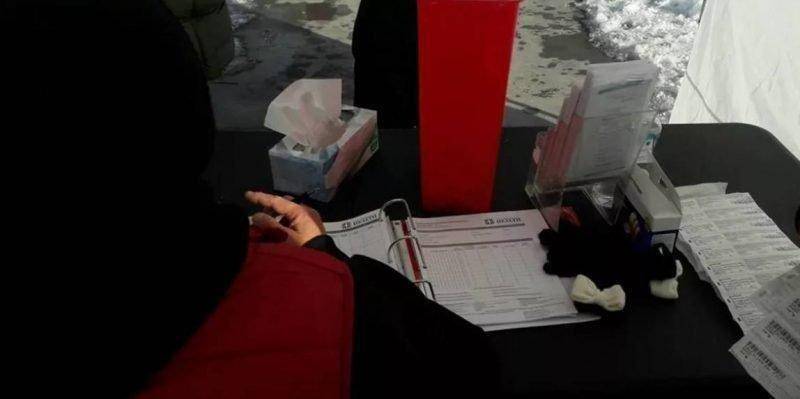Photo courtesy of the Utah Harm Reduction Coalition.
Controversy and doubts arose in a room where local community leaders met on Wednesday afternoon regarding a needle exchange program that will be coming to Castle Country.
In attendance were representatives from local law enforcement agencies, Four Corners Behavioral Health, Southeast Utah Health Department, Castleview Hospital and Gray Matters Counseling as well as the Utah Harm Reduction Coalition, which is the entity aiming to bring the exchange program to the area.
“What we would do is deliver syringes and all the things that people need to inject drugs safely,” said Mindy Vincent, the founder and executive director of the Utah Harm Reduction Coalition. “And as much as we can get our hands on Naloxone, we would also distribute Naloxone to all of the people that are in need of it.”
The purpose of the exchange is to not only provide new, sterile tools for injection, which aims to help limit the spread of disease among addicts, but also to connect drug users to local resources.
“This will be a safe place for people to have access to sterile syringes for IV drug use,” the coalition’s website shared. “You will learn techniques to protect yourself from contracting HIV, Hepatitis C and Hepatitis B. You will also learn methods to reduce the likelihood of developing abscesses and bloodstream infections.”
While distributing Naloxone is dependent on funds, the exchange program would include a package deemed “the works.” Each kit includes a needle, syringe, cookers, cottons balls, tourniquets, condoms and “everything you need to use to prevent disease,” according to Vincent. Information on treatment and local resources for those seeking help is also provided.
“I’m uncomfortable with it and I just want to say that right up front,” said Carbon County Sheriff Jeff Wood. “I don’t think Carbon County wants this.”
Concerns from local law enforcement were prevalent throughout the meeting, with officers claiming that the package “enables” and questioning why it is necessary to provide an entire kit, short of a heat supply and actual controlled substances.
“You can’t prevent disease with just providing syringes,” Vincent explained. “If we do not give the cottons and the cookers, we do not prevent the spread of disease.”
According to the Utah Code (Title 26, Chapter 7, Section 8), nonprofit organizations can legally operate a syringe exchange program in the state to prevent the transmission of disease and reduce morbidity and mortality among individuals who inject drugs and those individuals’ contacts. These nonprofit organizations are funded by donations and grants as well as the Utah Department of Health.
“So I can be clear, you’re not asking to come here, you’re telling us you’re coming here?” said Sheriff Wood.
Many other law enforcement officials expressed direct desire to not have the program offered in the area, echoing Sheriff Wood’s concerns.
“Well, I would rather collaborate and all of us work together but yes, we will provide syringe exchange services, you know, regardless,” said Vincent.
“It looks like a slippery slope,” Emery County Sheriff Greg Funk responded.
Vincent plans to start the program locally in the end of March. The program will kick off with two visits per month locally before making any possible adjustments based on need.
The program has already began in Salt Lake City, where a constant location serves as home to the exchange. However, in Castle Country, Vincent sees the program running differently.
“A mobile exchange is the best way to do it,” Vincent explained. “We don’t want to be an interruption to the community, so delivering to their homes is the best way.”
For more information about the Utah Harm Reduction Coalition and its exchange program, please visit www.utahharmreduction.org.
Below is an excerpt from Wednesday’s meeting, featuring Vincent.
[jwplayer player=”1″ mediaid=”199762″]

